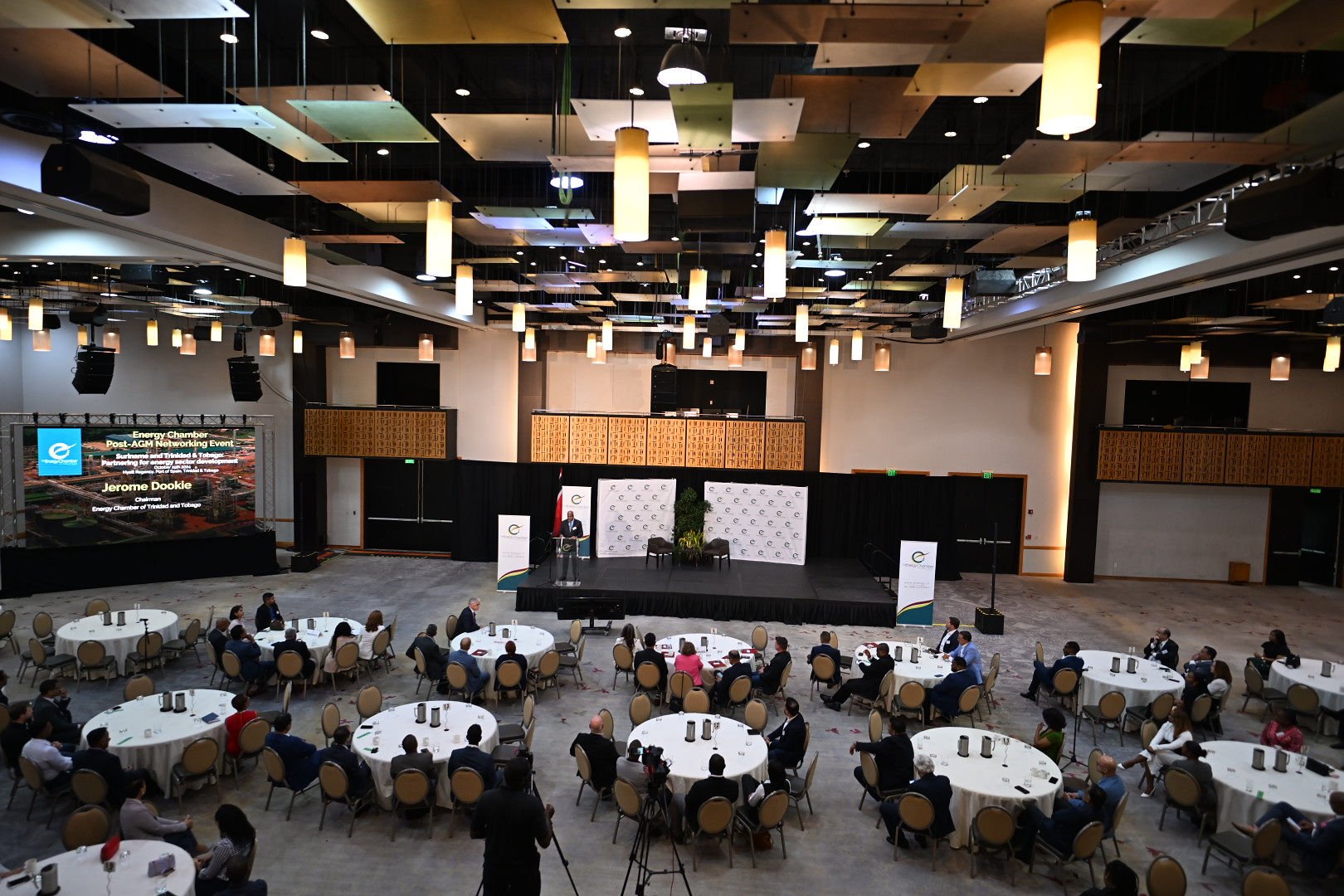Chairman’s Address:
Post AGM Event - Suriname and Trinidad & Tobago: Partnering for energy sector development
Jerome Dookie, Chairman, Energy Chamber of Trinidad and Tobago
October 25th 2024
Hyatt Regency Hotel, Port of Spain
It gives me great pleasure to welcome all of our members and visitors here today at our annual post-AGM event. I am especially pleased to welcome Mr Eddy Frankel, Deputy Director of Staatsolie, the state oil company of Suriname. Staatsolie are long-time members of the T&T Energy Chamber, which I think is testimony to the very close and cooperative relationship that exists between the energy sectors of both our countries. For almost two decades, the Energy Chamber has been arranging trade missions and attending events in Suriname and we have had many, many presentations from Staatsolie leaders at our annual T&T Energy Conference and at other events.
There are many deep and productive relationships already in place at the level of government, industry and individuals. With the exciting prospects in store for the Surinamese energy sector, I expect that many more mutually beneficial business relationships will build on the existing strong foundations.
One of the most important advocacy objectives of the Energy Chamber is greater regional integration in the energy services sector. We believe that there is huge potential to be had by increased trade in services within the CARICOM region. We believe that all companies and countries will ultimately benefit from increased trade in services, and we need to remove the current barriers that exist to ensure that we really do have a CARICOM single market and economy.
There are also huge potential benefits to be had from linking together the infrastructure within our region; whether this be electrical grids in the eastern Caribbean to facilitate the trade in green electrons produced by geothermal; or gas pipelines to link the newly discovered resources in Guyana and Suriname with the existing well-developed gas market in Trinidad. There are some tantalizing opportunities that exist to connect the potential huge geothermal electricity resources in the Eastern Caribbean with the existing petrochemical industry in Trinidad which has an unsatisfied demand for low carbon hydrogen. Trinidad’s service company knowledge and expertise could play an important role in unlocking this potential, as we have recently seen with one of our members, Kenesjay Green, working with the Republic of Dominica.
Some of the investments might seem daunting and technically complex, but it is perhaps worth remembering that this Chamber had the vision to create a world-class petrochemical hub on what were then sugar cane fields in Point Lisas. Perhaps we need to channel some of the vision of people like Bobby Montano and the other founders of what was then called the South Trinidad Chamber and their audacious ambition that led to the incorporation of the Point Lisas Industrial Port Development Corporation (PLIPDECO) back in 1966.
The Energy Chamber has championed the full implementation of the CSME for decades. Over the past few years, much of our advocacy work in this area has been through the CARICOM Private Sector Organization, which has a mandate to represent the private sector at CARICOM and to advance the implementation of the single market. We have also been very active in the Caribbean Chambers Network, or CARICHAM, that pulls together all of the national Chambers in the region and fosters good relationships between members of all of the Chambers. We have also recently joined the Caribbean Energy Chamber, which seeks to advance the energy transition in the region through coordinated action.
One area where immediate action could be taken is with the full implementation of free movement of people. We need to make it easy for all of our citizens to be able to move between countries in the region and for our companies to have their skilled employees available to work on projects wherever the opportunity exists. In addition to allowing workers to move freely, we need to work on creating uniform qualifications and standards across the region.
In Trinidad & Tobago we have developed many competency-based job standards, and the industry here will soon embark on a project to systematically certify workers against these standards, building on a previous initiative by Methanex in partnership with the NESC-TI and the Energy Chamber. It would be great to see these standards being adopted across CARICOM through the Caribbean Vocation Qualification (or CVQ) system. We know that there has already been excellent collaboration between the Kersten Training Centre in Suriname and at least one of our member companies, HHSL, and we are sure that there are many other opportunities for collaboration in the area of training and competency development.
It would also be great to try to coordinate industry safety standards, such as Safe to Work. This is something that is under active discussion between the Energy Chamber and Staatsolie and other stakeholders in Suriname.
There are also huge benefits to be had if we could make the movement of equipment between territories easier. If we are able to create a bigger market for large pieces of capital equipment, we will be able to keep these in the region and avoid some of the high costs associated with mobilization and demobilization out of places like the Gulf of Mexico. Within Trinidad and Tobago, we have seen the cost advantages that can come through sharing arrangements for rigs and vessels. There is no reason why such arrangements could not be extended to include operators in more than one country in the region.
In closing: Regional integration is in everyone’s interest. The Energy Chamber is committed to continuing the fight for this long-term objective. Visits like the one we have had from Staatsolie this week strengthen our resolve to continue to advocate for the CSME.
I trust that this afternoon’s session will be an engaging one, and I look forward to spending time with everyone at our reception later on.

